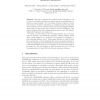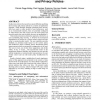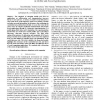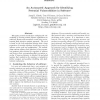35 search results - page 5 / 7 » Empirical models of privacy in location sharing |
VMCAI
2009
Springer
14 years 2 months ago
2009
Springer
This paper describes the methods used in Empire, a tool to detect concurrency-related bugs, namely atomic-set serializability violations in Java programs. The correctness criterion...
CCS
2008
ACM
13 years 9 months ago
2008
ACM
Studies have shown that users have great difficulty specifying their security and privacy policies in a variety of application domains. While machine learning techniques have succ...
CSE
2009
IEEE
14 years 2 months ago
2009
IEEE
— The emphasis of emerging mobile and Web 2.0 applications on collaboration and communication increases threats to user privacy. A serious, yet under-researched privacy risk resu...
SP
1998
IEEE
13 years 11 months ago
1998
IEEE
This paper presents results from analyzing the vulnerability of security-critical software applications to malicious threats and anomalous events using an automated fault injectio...
AGENTS
2000
Springer
13 years 11 months ago
2000
Springer
This paper describes and evaluates three methods for coordinating multiple agents. These agents interact in two ways. First, they are able to work together to achieve a common poo...




